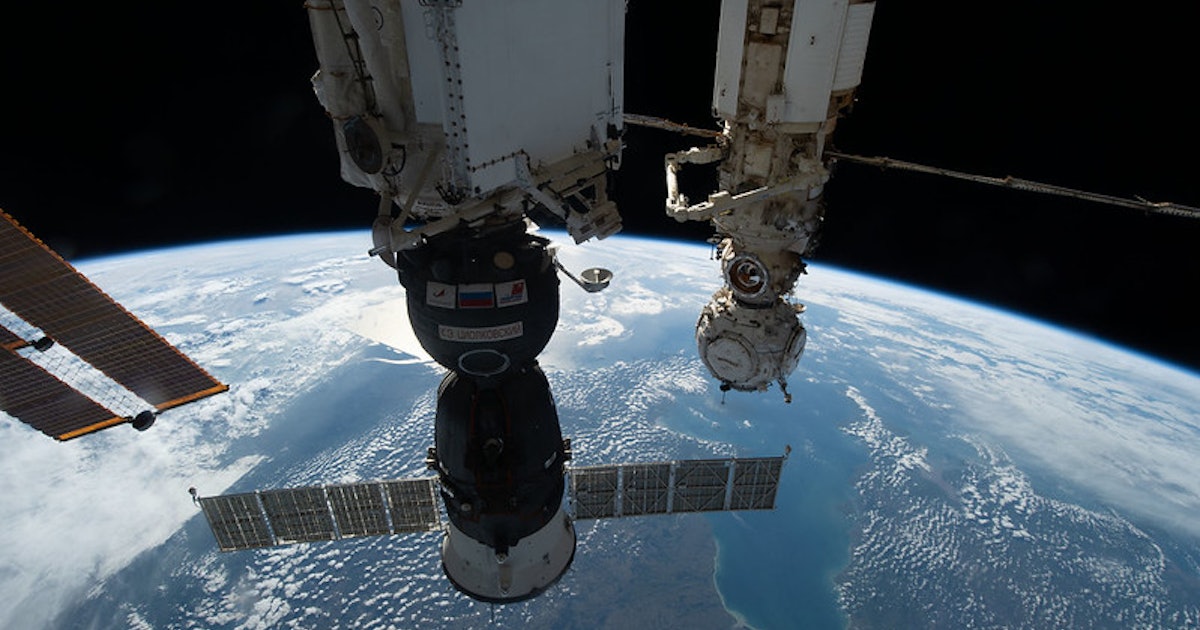
Russian Soyuz capsule sprung a coolant leak in space last night — here’s how serious that could be
A leak sprung from a Russian crew capsule in space on Wednesday at 7:45 p.m. Eastern, spraying coolant into low-Earth orbit. This happened less than two hours before a scheduled spacewalk. As of Thursday afternoon, an ongoing investigation by NASA and Russia has “indefinitely postponed” the next spacewalk.
This is a developing story. First and foremost, the crew on the ISS is safe.
This “visible stream of flakes,” NASA communications officer Rob Navias described the sight during a live stream, raises a question of whether or not the Expedition 68 crew on the International Space Station (ISS) will face a hurdle to come home next year. Crew capsules perform both the outbound and return trips. The Expedition 68 mission is scheduled to end in March 2023.
Three spacefarers hitched a ride to low-Earth orbit on September 21 onboard this Russian Soyuz MS-22 capsule. That included the two Russian cosmonauts — Sergey Prokopyev and Dmitri Petelin — who were getting ready to exit the International Space Station’s Poisk module airlock for a spacewalk on Wednesday. NASA astronaut Frank Rubio, not involved with the spacewalk, was the Soyuz’s third passenger.
“The crew members aboard the space station are safe, and were not in any danger during the leak,” NASA’s Space Station blog said on Thursday. “The space station is in good condition, and the Expedition 68 crew is safe,” NASA’s Space Station Twitter account tweeted on Wednesday.
At the time of the leak, the duo was getting ready to exit for a 7-hour spacewalk. Also known as an EVA – short for extravehicular activity – this procedure would have picked up the work Prokopyev and Petelin left off from their November 17 spacewalk. This would have marked the 12th ISS spacewalk of 2022, designed to transfer a radiator from the ISS Rassvet module and then connect it to the Nauka multipurpose laboratory module. Nauka was a 2021 addition to the ISS and also had a drama-fraught episode upon arrival, in which it misfired its thrusters and caused the ISS to tilt from its typical position in orbit.
As of Thursday afternoon, NASA and the Russian space agency Roscosmos have shared limited information during their ongoing investigation.
“The spacewalk has been canceled, and ground teams in Moscow are evaluating the nature of the fluid and potential impacts on the integrity of the Soyuz spacecraft, which carried Prokopyev, Petelin, and NASA astronaut Frank Rubio into space after launching from the Baikonur Cosmodrome in Kazakhstan on Sept. 21,” NASA shared on Wednesday in a blog post.
“The cosmonauts did not exit the space station, and no crew members were exposed to the leaking coolant,” NASA wrote in a Thursday afternoon update.
In a later post, NASA officials shared that the suspected leak source is “the external radiator cooling loop of the Soyuz.”
“Roscosmos is closely monitoring Soyuz spacecraft temperatures, which remain within acceptable limits,” NASA added. “NASA and Roscosmos continue to coordinate external imagery and inspection plans to aid in evaluating the external leak location. Plans for an additional inspection of the Soyuz exterior using the station’s Canadarm2 robotic arm are underway.”
According to the Russian state news agency TASS, “the loss of pressure in the thermal system of the Soyuz spacecraft docked to the station” triggered the suspension of Wednesday’s spacewalk.
In a separate TASS post, it said that a preliminary assessment shows that the leak came from damage to “the external casing of the Soyuz MS-22 crew spacecraft’s instrumentation and equipment compartment.”
TASS added that “the crew later reported an activation of the sensor of the spaceship’s fault detection system that signaled a drop in pressure in the cooling system.”
Former NASA astronauts took to Twitter to voice their concerns. Former Twins Study U.S. astronaut Scott Kelly called the leak a “serious situation.” Canadian astronaut Chris Hadfield shared his thoughts via the social media platform, too, also describing its nature as “serious” and adding, “Not good, lots of fast decision-making going on.”
A leak sprung from a Russian crew capsule in space on Wednesday at 7:45 p.m. Eastern, spraying coolant into low-Earth orbit. This happened less than two hours before a scheduled spacewalk. As of Thursday afternoon, an ongoing investigation by NASA and Russia has “indefinitely postponed” the next spacewalk. This is a developing story. First and…
A leak sprung from a Russian crew capsule in space on Wednesday at 7:45 p.m. Eastern, spraying coolant into low-Earth orbit. This happened less than two hours before a scheduled spacewalk. As of Thursday afternoon, an ongoing investigation by NASA and Russia has “indefinitely postponed” the next spacewalk. This is a developing story. First and…